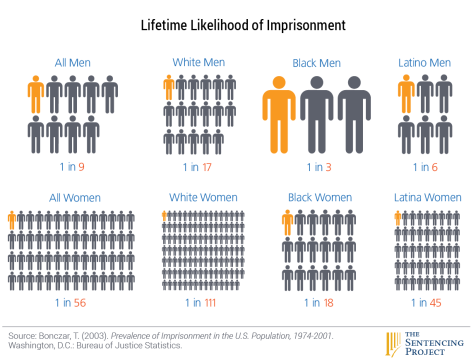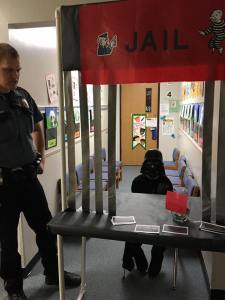Every now and then I enjoy seeing what Polk Elementary is up to – the school where I spent seven years of my young life! There were lots of great times, lots of nightmares, too.
This past weekend when I was looking at its Facebook page, I discovered they had just had the annual Fall Festival. (When I was there, it was in April and called Polk Planet Earth Day.)
Anyway, I enjoyed looking at the pictures…until I came across these two photos:
-click to enlarge-
Lately, I am more and more concerned about the relationship citizens have with police. (There are, of course, lots of wonderful individuals working in the police department – but I study and critique systems.) These issues are partly discussed in the new film 13th.
Anyway, apparently part of Polk’s Fall Festival includes some kind of activity where young people are (play) arrested, (play) placed in jail, and someone has to pay real bail money for said person to be released. There is an armed, fully equipped and fully uniformed police officer monitoring the proceedings, too.
Wow! So much to unpack and to say, but I will just provide a few thoughts.
While such seems “normal” and only “fun and games,” there is much more to it, especially given that the United States actually–really and truly–puts more people behind bars than any other country on this planet. People deemed “criminals” and locked away are treated horrifically. Such treatment should never be subject to fun and games, in the same why that we can never make light of enslavment.
Polk Elementary is increasingly populated with minority (i.e., non-White) students. Statistically speaking, a significant number of children who attend Polk Elementary have relatives who are currently behind bars, have been, or will be. Additionally, a large number of these children will themselves be put behind bars unless major reform happens — and reform in the way of eliminating institutional, codified racism.
This “fun” Fall Festival event merely tries to establish the cruel and unusual as normal and everyday, maybe even kind of “fun” and okay, too. It also introduces children to the vocabulary, the rhetoric, the signs and symbols of being incarcerated. And it vastly simplifies the process of getting out of jail, as many people cannot afford bail.

Event matter. While one event, such as the one discussed in this article, likely has little consequence, children remember more than they are given credit for. They understand. They think. And we live in a culture where the new military urbanism is only becoming more common, accepted, and unquestioned.
Andrew Joseph Pegoda


